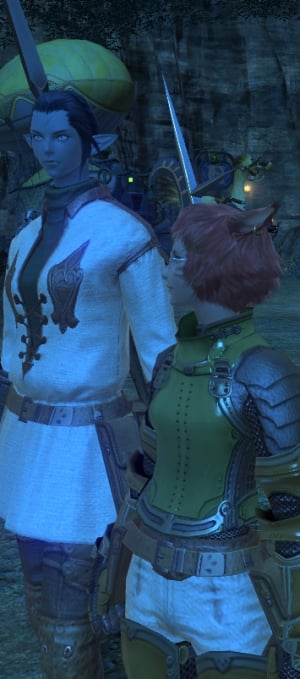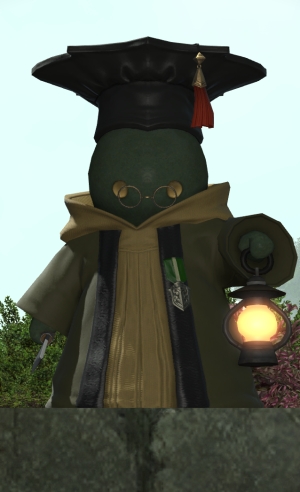
About halfway into writing that response, I realized that I was already most of the way to writing a separate column. So now we have this here.
See, there’s an interesting point to be made about the rigid nature of jobs, the limitations that they impose upon the game’s systems, and perhaps most importantly how we got here in the first place. Especially when you consider that when the game launched, you had a class without any particular restrictions on what it could equip, much less with any jobs at all.
 The Armoury System, as originally conceived and launched, was nothing like the current system. I don’t just mean that in the sense that skills were different or were arranged differently, although that was also true; I mean that the whole functionality of the system was different. There were no combos, for one thing. And there was no automatic use of job actions. What you got was a pool of points to allocate to various abilities.
The Armoury System, as originally conceived and launched, was nothing like the current system. I don’t just mean that in the sense that skills were different or were arranged differently, although that was also true; I mean that the whole functionality of the system was different. There were no combos, for one thing. And there was no automatic use of job actions. What you got was a pool of points to allocate to various abilities.
You always had enough points to equip all of your class skills, of course. But the funny thing is that none of them was actually mandatory. You could completely eschew all of your class actions in favor of skills from some other class, and the game would keep humming along just fine.
This went will with an attribute bonus system that allowed you to literally reallocate all of your attributes as you leveled up. It was kind of absurd.
Now, there were obvious up sides to this system, but it suffered from several downsides that were far more serious. To just point out the most egregious of the bunch, there was basically no reason for your character not to be a self-healing unstoppable tank damage machine, because there was no ability synergy anyway and Lancer was the most attractive chassis for carrying every skill. Different? Yes. But hardly good, lest we romanticize the earliest systems. It was an unpleasant mess.
When Naoki Yoshida came on board, one of his goals was to fix the fact that this system basically did not work at all. Thus, skills were elaborately restructured, and what was put into place more closely resembled what we have now. Classes have a fixed progression with a few spots for additional abilities, which (at the time) were taken from several other abilities available from each job. It was still more flexible than what we have now, but there was actually a reason to play as something other than Lancer when you wanted to get things done.
Jobs, originally, were introduced less as “here’s what you play” and more as “here’s a sharpening in a specific direction.” Using a job meant giving up a lot of cross-class abilities (which was a pretty wide pool in 1.0, even after changes). However, it also meant gaining some other new abilities. The idea was that you’d want to use a Job in group content, but for solo play you would probably want your base class instead.
Now, let’s jump to version 2.0, which was no longer a bandage stuck on a gushing wound that was the game’s mechanics. Now class progression and design had been tightened and improved. Bonus attributes were better-handled. And we had our first class that split into multiple jobs with Arcanist, which could become a Summoner or a Scholar. Obviously, this was the future of the game, with our same base jobs turning into more than one secondary job over time, right?
Well… perhaps not so much.
The list of “additional” actions shrank a fair bit here, and the problem became pretty obvious early on when the developers (and players) realized that there was no real reason not to be in a job at all times. Moving to a job meant gaining five abilities that directly contributed to what you wanted to do, while losing five abilities that didn’t significantly enhance your capabilities anyway. If you’re killing things significantly faster on Dragoon than on Lancer, the slight drop in defensive ability doesn’t matter, much less not being able to use Cure on yourself.
 Arcanist also showed off some weaknesses with the system right from the get-go. It had been designed from the ground up to split into two separate jobs, but that made for serious problems for players who wanted to do both, especially because bonus attributes really forced you to specialize on one or the other. Respecs were important, expensive, and also frustrating, since they were just for attribute bonuses.
Arcanist also showed off some weaknesses with the system right from the get-go. It had been designed from the ground up to split into two separate jobs, but that made for serious problems for players who wanted to do both, especially because bonus attributes really forced you to specialize on one or the other. Respecs were important, expensive, and also frustrating, since they were just for attribute bonuses.
By making the jobs more well-defined (something players had wanted) and giving more reasons for players to stick with them (another thing players had wanted), the game had gutted the diversity it started out with. It was telling that no new cross-class actions were added to the game after the 2.0 relaunch; while Rogue had a couple of actions other classes could use, no jobs could use them.
When Heavensward rolled around, classes were killed. Not functionally, of course, but for all practical purposes they died the moment it was announced that the three new jobs would exist only as jobs. Not only did this mean none of them could offer cross abilities, it signaled that classes were fundamentally seen as a failed experiment. It basically killed any “well, job X could spin from class Y” arguments in the water, because you can’t spin anything off of the root class for Dark Knight. It’s always Dark Knight.
And then Stormblood rewrote the rules again by abandoning the cross-class action system altogether, removing the bonus attribute system, and generally making jobs even more isolated bits of design.
The problem here is that all of these changes have, on the face of it, been good changes. Looking at the jobs that have changed the most in gameplay from launch to now, I wouldn’t want to play Thaumaturge or Lancer from the game’s launch version compared to Black Mage or Dragoon right now. It’s been a steady process of refinement and improvement all along the way.
But there are costs associated with it, and one of the problems is that we have not even a sliver of flexibility left in the system. The lack of base classes means that the next expansion is more than likely going to do away with them outright (we’re most of the way there now). Our role actions are neat and useful, but they’re a very narrow list and offer little opportunity to make a given job feel distinct from other players of the same job. The Armoury System, at this point, feels like a traditional job system except without the usual fun ability to mix-and-match job abilities.
This isn’t going to be something that changes mid-expansion, of course. It might not even change for the next expansion, because the actual experience of playing the various jobs remains distinct and fun. But I think it’s worth considering and observing how we got here, as it’s a result of good and well-considered decisions that have led to a place where we do see a vanishing spread of options for future weapons and future jobs.
Whether or not that’s a bad thing depends on your point of view, of course. There’s arguments to be made in both directions.
Feedback, as always, is welcome in the comments below or via mail to eliot@massivelyop.com. Next week, just for giggles, I think I’ll talk about my theory regarding the remaining expansions for the game and hang a whole lot of speculation on remarkably little evidence. Unless another great comment turns into an unexpected column first.
 The Nymian civilization hosted an immense amount of knowledge and learning, but so much of it has been lost to the people of Eorzea. That doesn’t stop Eliot Lefebvre from scrutinizing Final Fantasy XIV each week in Wisdom of Nym, hosting guides, discussion, and opinions without so much as a trace of rancor.
The Nymian civilization hosted an immense amount of knowledge and learning, but so much of it has been lost to the people of Eorzea. That doesn’t stop Eliot Lefebvre from scrutinizing Final Fantasy XIV each week in Wisdom of Nym, hosting guides, discussion, and opinions without so much as a trace of rancor.














